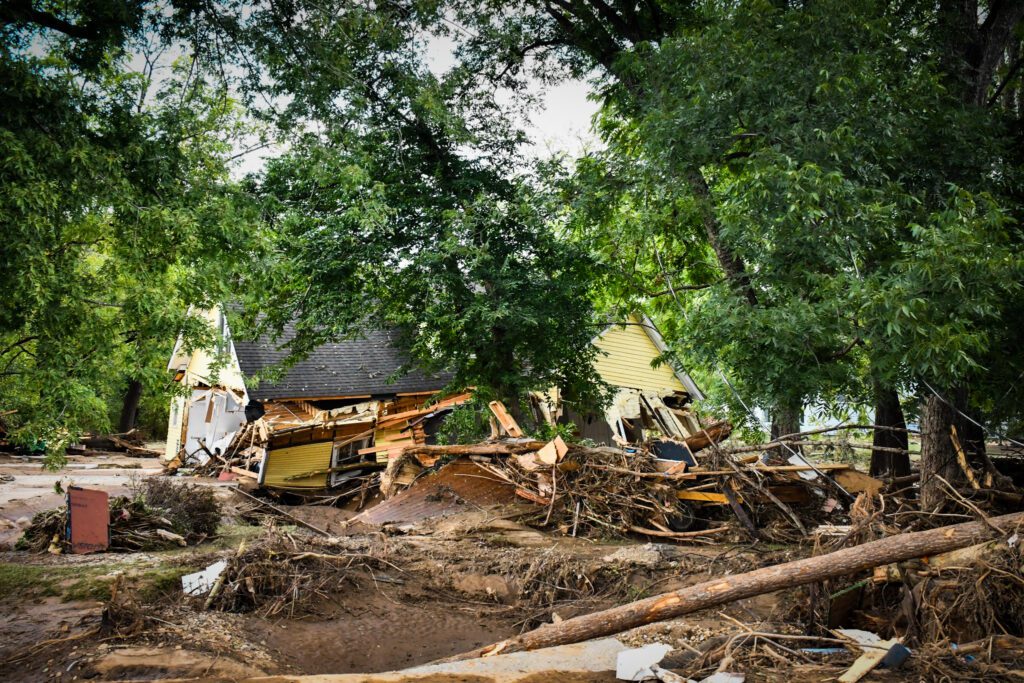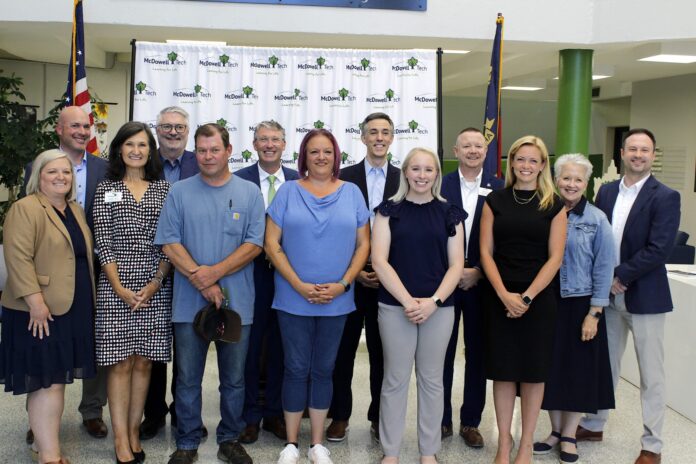The Buck Creek Trout Farm is a family business in Marion owned by Bill and Beth Ross for over 50 years.
Andrew Turnbull lived on the property as the resident caretaker for the fish over the past decade, where he became accustomed to facilitating the growth of rainbow trout. In 12-18 month cycles, he would watch as they emerged from their tiny eggs and developed to one pound — the ideal size to be sold.
“Once you get into it, it’s not something you can sit and forget. You’ve got to be there every day. I just got used to that and enjoyed it,” Turnbull said.
When Hurricane Helene devastated western North Carolina last fall, it not only destroyed the farm, it also destroyed Turnbull’s dwelling. Describing his experience of living through Helene and witnessing the physical destruction, Turnbull said, “I’ve seen the power and violence of it. It’s frightening.”

Now, approximately eight months into the recovery amid the aftermath of Helene, Turnbull adamantly expressed, “we can rebuild and we will.” Turnbull wants to play an active role in helping both the farm and his community.
With that spirit, and through the support of the state’s emergency grants and scholarship programs, 54-year-old Turnbull has enrolled at McDowell Technical Community College, pursuing an education in construction and heavy equipment. “That need is going to be ever present as we continue to rebuild and also for future disasters,” he said.
Turnbull considers the tuition assistance and ability to learn new skills a blessing. Importantly, beyond opening himself to new opportunities for employment, Turnbull said that the new skills will also enable him to volunteer in the event of future emergencies.
“I’m looking forward to being able to use my skills to help things, to rebuild things, and to make the world a better place,” he shared. “I’m just very thankful for that.”
Sign up for Awake58, our newsletter on all things community college.
The return of a dream
According to a press release from the Governor’s Recovery Office for Western North Carolina (GROW NC), more than 45,000 scholarships and grants have been awarded to Helene-impacted students like Turnbull, along with students at Helene-impacted schools.
More than $48 million in emergency funding was directed to provide financial support to students in the North Carolina Community College System, UNC System, and at private universities and colleges. According to GROW NC’s director, Matt Calabria, more than 20,000 of the scholarships and grants were distributed to students enrolled at community colleges, nearing a total of $23 million in emergency funds.
On June 17, Calabria met with McDowell Tech students and administrators, highlighting the impact of the emergency funding on community colleges.
“After Hurricane Helene struck western North Carolina, students faced a major disruption to their studies,” Calabria said in the press release. “The students I met today from McDowell Tech showed tremendous resilience. We’ve sought to do everything we can to help alleviate some of the financial burdens on students through state-funded emergency grant and scholarship programs.”
McDowell Tech nursing student Jennifer Messer stated, “my story isn’t one of losing at all, it’s one of unity, resilience, and rising from crisis with purpose.”
Though she initially dropped out of high school after years of multiple transitions within the foster care system, Messer earned her GED from McDowell Tech in 2007. She continued her education to be a certified nursing assistant (CNA), but ultimately made the decision to be a stay-at-home mom during the period.
Now in 2025, Messer says that she is “chasing a dream that I thought was long lost.”
Following the impact of Hurricane Helene, Messer felt drawn to help others. As one of the few in her area with cellphone service, she stated she helped others connect with their families. Additionally, she helped pull together multiple loads of supplies in a U-Haul with the support of relatives in West Virginia.
“People wrapped around us, helped us. Volunteers came in, and then, before you knew it, these partnerships turned into more like a family — more like a brotherhood/sisterhood, that we are together and we’re going to make it through this. So that’s now the ripple effect of that — the trust that was built.”
Dr. J.W. Kelly, president of McDowell Tech Community College
Even after those efforts, Messer asked herself: “How can I be of greater help, not just today, but next time — because there’s always going to be a next time.” Thus, she took a leap of faith, using the emergency funding to enroll at McDowell Tech.
Since then, Messer has completed her CNA certificate and has continued into the pre-nursing track on the path to becoming a registered nurse.
Messer feels that the moment has provided her with purpose, dignity, and ability to not only build a future for her family, but to help her community in times of need.
“Hurricane Helene didn’t just bring devastation,” Messer said. “It brought a spark. It lit a fire in me to do more and to be more and thanks to the grants that have been provided through the state and federal aid, I have been able to not only dream, but act.”
Pushing through the finish line
Florence Nightingale is regarded as the founder of modern nursing. Also referred to as “The Lady with the Lamp,” Nightingale’s legacy is preserved at nursing pinning ceremonies in which a lamp is lit, a symbol of her contributions to the field.
As a 2025 graduate of McDowell Tech’s nursing program, Carli Cook recently experienced the beauty of the ceremony firsthand. The 23-year-old Marion native had the opportunity to hear her name called as she walked across the stage, receiving her lamp, a rose, and a pin designed by a fellow McDowell Tech student.
Cook stated that the emergency funding helped her push through difficult times in order to cross that stage.
When her father became ill, Cook left Appalachian State University, becoming the primary financial provider as she worked to take care of him until his passing in April. Amid her father’s health battle, Cook also faced unemployment after Helene flooded J. Hartman’s, the local restaurant that she worked at.
“McDowell County is open for business. If you love to bike, hike trails, or camp, then this is definitely the spot for you. There’s miles upon miles of trails to explore and to see and waterfalls, and it’s just wonderful things to visit. Not only that, but we believe the future is bright. We don’t have our heads down or our tails between our legs worrying about it. We’re looking to the future, and how can McDowell County and western North Carolina grow to be even better.”
Dr. J.W. Kelly, president of McDowell Tech Community College
Reflecting on her recent experience, Cook shared that in spite of the feelings of wanting to give up at times, the funding for school helped her push through.
Now, having received her licensure, she plans to work as an emergency room nurse. “I’ll be able to help care for the community, especially when another natural disaster happens,” Cook shared. “I’ll be able to be one of those front lines that are able to help.”
For Cook, this moment has unlocked a path for future opportunities such as receiving advanced degrees. In the meantime, as she awaits the next phase of her nursing career, one thing that has given her hope is returning to J. Hartman’s.
“They’ve given so much to me being able to work there. I wanted to be able to give back,” she stated. “Now that it’s back open, just seeing people back in there again, it’s really, really great.”
In all, Cook expressed her appreciation for the emergency funding that helped her complete her degree.
“I could focus on taking care of my dad and previously help get the restaurant back up and running, instead of having to worry about paying for school,” she said. “Being able to have that push of my schooling paid for, even after my dad passed away in April, it helped push me to the finish line.”
